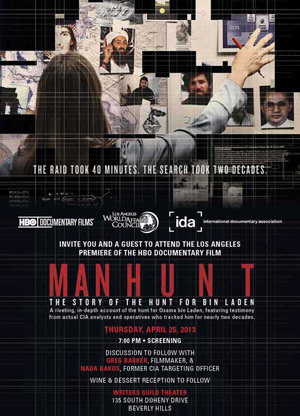The “Manhunt” screening last night was so engrossing that it kept people talking very late at the reception afterwards – I left at 11.15 and there were still some guests chatting in the lobby of the movie theater. The documentary – produced by HBO - opened a rare window on the normally closed world of the intelligence community – showing how the CIA agents who has spent the best part of two decades trying to track down Osama bin Laden felt about their job, and about their inability to “join the dots” to prevent the 9/11 attacks – and then their feelings of dismay when they were accused afterwards with the benefit of hindsight of not doing enough.
Central to the film was the fact that many of the CIA targeters were women – and we were very fortunate to have one of them, Nada Bakos, who came to the screening and took part in the q&a afterwards. Ms Bakos said that the women who worked in “Alec Station”, the name given by the CIA to the unit responsible for tracking down bin Laden, brought a certain level of methodical patience to the job that their male counterparts might have lacked – that ultimately paid off. She also said her work as a CIA targeter required her to be very certain of her “moral center”: “I knew that my work could well lead to the target being killed – and I had to be ok with that – and I was.” But it was not something that came naturally at first: “I started out in college thinking I'd work for an NGO and save the world.”
Greg Barker, the film maker, showed the moral complexities of the intelligence community’s work, and through the characters interviewed he presented the arguments both for and against the “enhanced interrogation techniques” that have since become so controversial. In the end, nobody in the United States was left untouched by the attacks of 9/11 and our nation’s response to those attacks, both at home and overseas. War always leaves indelible traces. “Manhunt” skillfully illuminated some of the less well-exposed aspects of this traumatic period in our history.

